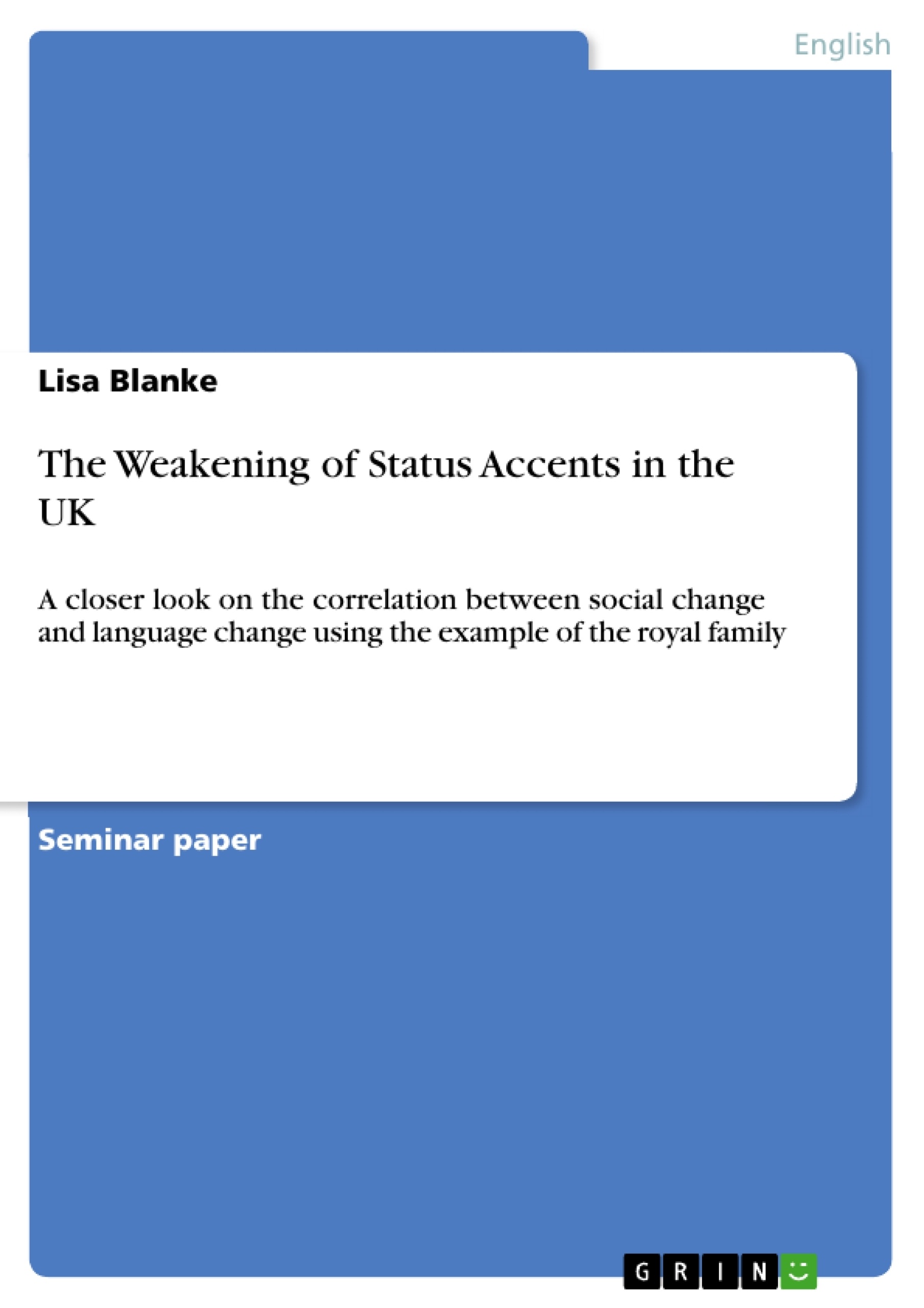Today, English is one of the most spoken languages in the world and has a huge impact on the everyday life of millions of people. As a lingua franca, English is the world’s widely used language and is spoken in 101 countries all over the world , each of them adding their own flavour to the mixture. So exposed to influences of all kinds, the English language seems to be constantly changing. The one thing that unites the huge amount of varieties, and therefore people, has to be the root of the language they share, which is English as it is spoken in England by the family of the English society and especially by the Queen, Elizabeth II. But as the monarchy seems weakened through social changes, ‘the Queen’s English’, which is often put on a level with Received Pronunciation (RP), is no longer as popular. So Britain is a current example of language change in times of globalisation and democratisation, which shapes language ideology. In this context, it might be interesting to take a closer look at what ‘Queen’s English’ stands for and why it changes by reference to studies over a longer time period, to draw inferences with regard to social reasons.
Inhaltsverzeichnis (Table of Contents)
- Introduction
- Sociolinguistic Background
- Class accents
- Does the Queen Speak ‘Queen's English’?
- How Did the Perception Change?
- Changing the Public Presentation of Royals
- The Tried and Trusted
- A Breath of Fresh Air
- Discussion
- Conclusion
Zielsetzung und Themenschwerpunkte (Objectives and Key Themes)
The main objective of this paper is to examine the weakening of status accents in the UK, specifically focusing on the example of the royal family. By analyzing the correlation between social change and language change, the paper aims to explore the evolving perception of "Queen's English" in relation to Received Pronunciation (RP) and its implications for language ideology in a globalized and democratized society.
- The role of social change in shaping language ideology
- The evolving perception of "Queen's English" and its relationship to RP
- The impact of globalization and democratization on language norms
- The influence of the monarchy on language usage and social values
- The relationship between class, language, and social status
Zusammenfassung der Kapitel (Chapter Summaries)
The introduction sets the stage by discussing the global prevalence of English and its constant evolution. It highlights the significance of "Queen's English" and its connection to RP, suggesting that its popularity is waning due to social changes. The paper aims to investigate the reasons behind this shift.
The chapter on sociolinguistic background explores the relationship between language and national identity. It emphasizes the role of the British monarchy in shaping language ideology, particularly through the notion of "Queen's English." The concept of "standard language" is analyzed, acknowledging both its positive connotations and its potential for ridicule. The chapter then delves into the concept of "destandardization" and "demotization," highlighting how social change can impact language norms.
Schlüsselwörter (Keywords)
The key terms and concepts explored in this work include language change, social change, language ideology, "Queen's English," Received Pronunciation (RP), globalization, democratization, standard language, destandardization, demotization, class, and social status.
Frequently Asked Questions
What is meant by "Queen's English"?
"Queen's English" refers to the variety of English traditionally associated with the British Royal Family and Received Pronunciation (RP), often seen as a standard of prestige.
Why are status accents weakening in the UK?
Social changes, globalization, and democratization have led to a shift in language ideology, making traditional high-status accents like RP less dominant.
Does the Queen actually speak "Queen's English"?
Studies over long periods show that even the Queen's speech evolved, reflecting broader sociolinguistic changes in British society.
What is "destandardization" in linguistics?
It refers to the process where a single standard language variety loses its exclusive status as the "correct" or "best" way to speak.
How does class relate to language in Britain?
The paper explores how accents have historically functioned as markers of social class and how these boundaries are becoming more fluid today.
- Citar trabajo
- Lisa Blanke (Autor), 2013, The Weakening of Status Accents in the UK, Múnich, GRIN Verlag, https://www.grin.com/document/264212



